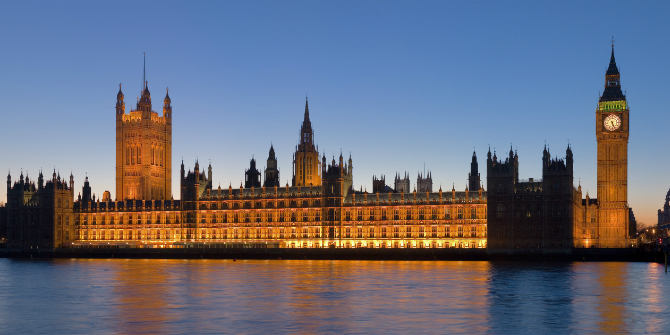

 Last week’s European elections may have been the dawn of a Europe of many visions. At least this is what the European election manifestos tell us about the potentiality for conflict, paralysis, and progress ahead, write Luke Cooper, Roch Dunin-Wąsowicz, and Niccolò Milanese, in a report produced by the LSE Conflict and Civil Society Research Unit, where they argue that Brexit has killed the politics of exit in Europe.
Last week’s European elections may have been the dawn of a Europe of many visions. At least this is what the European election manifestos tell us about the potentiality for conflict, paralysis, and progress ahead, write Luke Cooper, Roch Dunin-Wąsowicz, and Niccolò Milanese, in a report produced by the LSE Conflict and Civil Society Research Unit, where they argue that Brexit has killed the politics of exit in Europe.
The 2019 European election was the dawn of a Europe of many visions. It signalled the end of the period of bipartisan consensus in the European Parliament, increased political momentum around progressive visions, as well as a ‘coming of age’ of European politics and the end of the politics of exit in Europe. These are the main findings from our research on the election manifestos of pan-European political parties competing in this election.
Political manifestos are often seen as unimportant but they are in fact the contract between electorates and politicians that underpins democracy. This is equally true on the transnational level, where European political party families aim to unite not only their voters, but also their member parties. Hence, the European election manifestos are often just as much about grand visions as they are about specific policies. This is partially true because consent of member states is needed to create EU law. And while particular policy proposals may often struggle to be implemented after the election, the big picture visions give a snapshot of where European politics is heading. With the growing salience of European issues in national domestic politics, we used the manifestos as a framing device to understand what achievements of the EU to date are most appreciated by today’s politicians, as well as what values and ideologies drive political party machines. We also looked into what threats and opportunities lie ahead for the version of the European project they promote.
European elections also provide a uniquely international ‘snapshot’ of the European political scene. The manifestos bring out the different visions that are contending with one another to determine the future of the EU. They underline how Europe has become a highly pluralistic political space: a reality that may create fractures in the status quo advantageous to those seeking far-reaching political change or lead to a deepening of political paralysis in the years ahead. Our analysis identifies several features of the ‘new Europe’ being born in 2019.

End of the period of bipartisan consensus
In the twenty-first century the European People’s Party (EPP) and Party of European Socialists (PES) have together enjoyed a majority in the European Parliament. This led to a consensus politics in the Parliament where the parties cooperated actively to ‘get things done’. Many observers now predict this will change in the forthcoming European elections as the vote share of these parties comes under stress from an assorted range of liberal, green, left and right parties. However, even if they maintain their majority the manifestos suggest that both these parties are increasingly pivoting to the left (PES) or right (EPP), which will narrow the opportunity for cooperation around bipartisan consensus issues. The divisions within the European Parliament will still be shaped by the left-right division and by views on European integration. However, we observe an emerging salience of issues such as immigration and climate change that may further complicate the picture and may also weaken the Parliament in the potentially contentious negotiations with the Council over the post-election Commission.
Political momentum around progressive visions
While much of the focus of media discussion around these elections has focused on the rise of the radical right, the elections may well indicate increasingly momentum behind progressive reform efforts on the political centre and centre-left. With the appeal of French President Emmanuel Macron and his En Marche party for a new push around European integration, the pivot of the PES to the left, to the quite bold reform proposals of the European Greens, there appears to be strong momentum around progressive visions for the EU. These visions encapsulated in the manifestos are increasingly bolder and unapologetic about their quass-federalist and socially progressive (pro-migrant, green, socially just, non-discriminatory, feminist) policy ambitions. They are also very much values driven, verusa result of political bargaining that historically dominated politics on a European level.
This election sees the emergence of two transnational political parties, Volt and European Spring, which are not unprecedented (previous elections also saw the participation of trans-european parties), but have more extensive, ambitious and detailed policy proposals than the main parties.
A ‘coming of age’ for Europe?
These may well be regarded historically as the first European EU elections. Whereas they have historically been regarded as a proxy contest for national-domestic politics, this is no longer only the case. Europe has ‘come of age’ in 2019. European issues are now en par now dominate – for good or ill – with in national domestic politics across the continent. Five issues have promoted this Europeanisation of the political scene: the Eurozone crisis has underlined the need for reform at an EU-level; similarly, the migration crisis has also posited the need for a cooperative response while also igniting Eurosceptic sentiments; social issues of welfare and economic wellbeing are more strongly present than in past elections; and, finally, the climate emergency and the increased salience of this issue politically poses the need for European and international action. Connectedly, many of the manifestos of the parties situate Europe in a multipolar world in which the European model contrasts with, and may be threatened by, Russia, China or the USA.
Brexit has killed the politics of exit in Europe
A key tangible effect of Brexit has led to a reduction in support for further exits across the EU. Support for the EU is at an all-time high in the member states. Radical euroscepticism (support for exit form the club) is in decline across Europe. This is illustrated by the sharp turn undertaken by the parties aligned with the far-right bloc within the European Parliament. They mostly no longer seek exit from the EU in the short term but instead have orientated towards seeking the radical reform of European institutions towards a ‘sovereignty-ist’ Europe of nation-states.
These elections were marked by an increased sense of fragility of the European Union, the possibility of its demise and also the possibility of its radical transformation and redirection, even in a context where Treaty change is assumed to be impossible by almost all players. Whilst the parties have more or less ambitious and detailed proposals for the future of the European Union, there is now the sense that the European Union can change also without Treaty amendments, and that the elections are as much about influencing the way the political winds are blowing across the continent as the action of parliamentarians and in the institutions. Despite the dangers of such a moment, this is surely an important step in the coming of age of European politics.
This post represents the views of the author and not those of the Brexit blog, nor the LSE. It is an edited excerpt from a report produced as part of the Visions of Europe project at the LSE Conflict and Civil Society Research Unit. Image: CC-BY-4.0: © European Union 2019 – Source: EP
Dr Luke Cooper is a Visiting Fellow on the Europe’s Futures programme, an Associate Researcher at the LSE CCS, and a senior lecturer at Anglia Ruskin University. He is a co-founder of the Another Europe Is Possible campaign and co-host of the Another Europe podcast, and is currently researching a book the crisis of the crisis of the European Union in historical perspective.
Dr Roch Dunin-Wąsowicz (@RochDW) is Research Officer in European Studies, Civil Society and Social Movements at the LSE Conflict and Civil Society Research Unit, and Teaching Fellow in Sociology at the Department of Social Science, UCL Institute of Education. He is also Managing Editor of LSE Brexit.
Niccolò Milanese is Director of European Alternatives (www.euroalter.com) and co-author of Citizens of Nowhere: How Europe can be saved from itself (Zedbooks, 2018). He is a researcher at CESPRA, EHESS, Paris and a Jean Monnet fellow in 2018-2020.







1 Comments